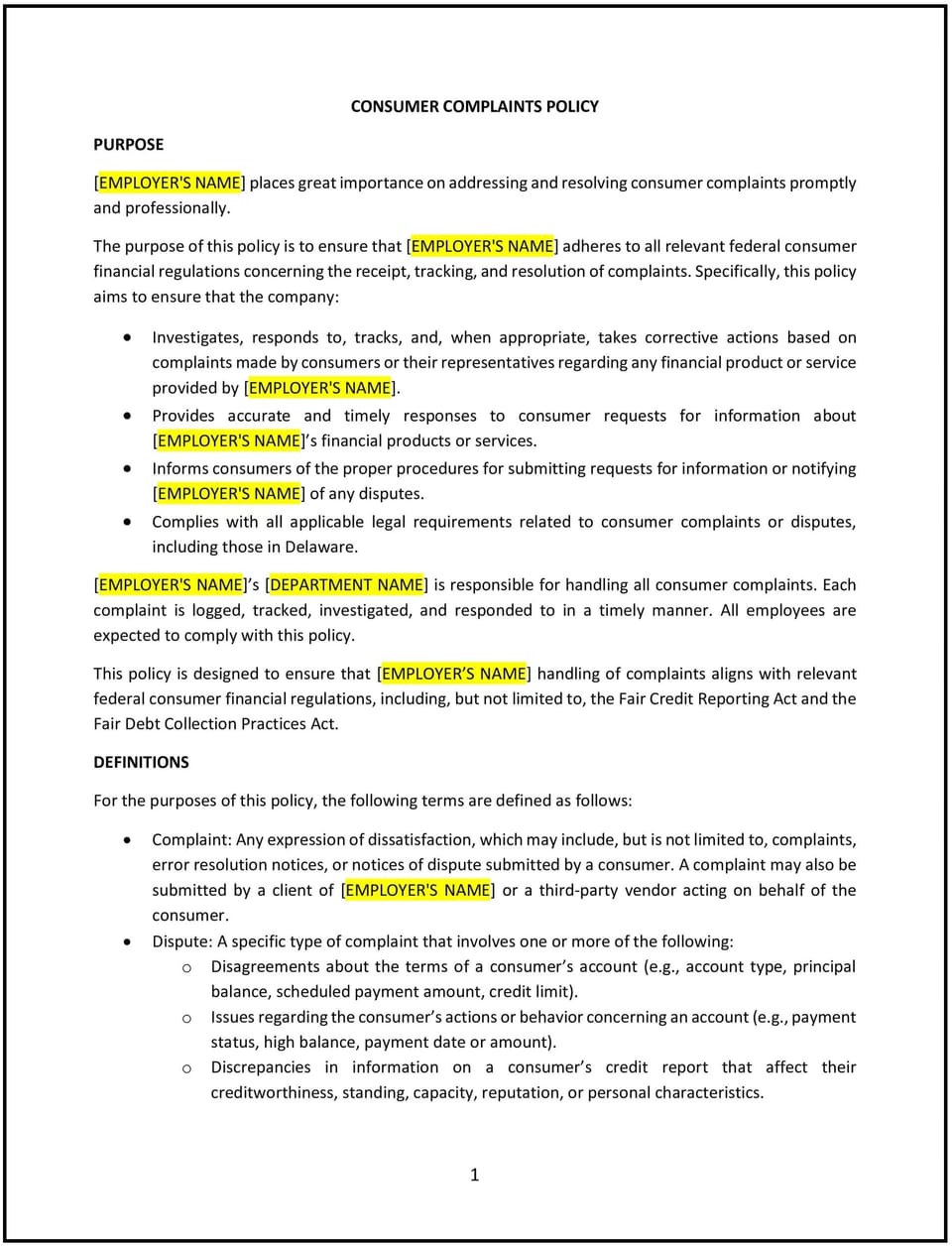Consumer complaints policy (Delaware): Free template

Consumer complaints policy (Delaware)
A consumer complaints policy helps Delaware businesses establish a clear framework for addressing and resolving customer complaints effectively. This policy outlines the procedures for receiving, investigating, and resolving complaints while ensuring compliance with Delaware consumer protection laws.
By implementing this policy, businesses can enhance customer satisfaction, maintain a strong reputation, and reduce legal risks.
How to use this consumer complaints policy (Delaware)
- Define complaint types: Specify the types of complaints covered by the policy, such as product quality, service delivery, or billing issues.
- Establish reporting channels: Provide clear instructions for customers to submit complaints, including options such as email, phone, or an online form.
- Acknowledge complaints promptly: Set a standard for responding to complaints within a specific timeframe to reassure customers their concerns are being addressed.
- Investigate thoroughly: Outline procedures for investigating complaints, including gathering relevant information and identifying the root cause.
- Resolve complaints effectively: Provide clear guidelines for resolving complaints, such as issuing refunds, replacing products, or offering additional services.
- Monitor and improve: Track complaint trends to identify recurring issues and implement improvements to prevent future complaints.
Benefits of using this consumer complaints policy (Delaware)
This policy offers several benefits for Delaware businesses:
- Enhances customer satisfaction: Demonstrates a commitment to addressing customer concerns promptly and fairly.
- Builds trust: Shows customers that their feedback is valued and helps maintain a positive business reputation.
- Reduces legal risks: Helps ensure compliance with Delaware consumer protection laws, minimizing the risk of disputes or regulatory penalties.
- Improves operational efficiency: Identifies and resolves recurring issues, leading to better processes and fewer complaints over time.
- Encourages customer loyalty: Turns negative experiences into opportunities to build stronger relationships with customers.
Tips for using this consumer complaints policy (Delaware)
- Communicate the policy clearly: Make the policy accessible to customers and ensure they understand how to submit complaints.
- Train employees: Provide staff with training on handling complaints professionally and effectively.
- Track and analyze trends: Use complaint data to identify common issues and implement improvements.
- Be transparent: Keep customers informed throughout the complaint resolution process to build trust.
- Review the policy regularly: Update the policy to reflect changes in Delaware laws, industry standards, or customer expectations.
Q: Why is a consumer complaints policy important for my business?
A: A consumer complaints policy provides a structured process for addressing customer concerns, improving satisfaction, and ensuring compliance with Delaware consumer protection laws.
Q: How can customers submit complaints under this policy?
A: Customers can submit complaints through the channels outlined in the policy, such as email, phone, or an online form, depending on the business’s preferred methods.
Q: What steps should my business take when handling a complaint?
A: Businesses should acknowledge the complaint promptly, investigate thoroughly to understand the issue, and resolve it effectively with actions such as refunds, replacements, or service improvements.
Q: How can this policy help my business improve operations?
A: Tracking and analyzing complaint trends can help identify recurring issues and drive improvements in processes, products, or services to prevent future complaints.
Q: How often should this policy be reviewed?
A: This policy should be reviewed annually or whenever there are changes to Delaware laws, customer expectations, or business practices to ensure it remains relevant and effective.
This article contains general legal information and does not contain legal advice. Cobrief is not a law firm or a substitute for an attorney or law firm. The law is complex and changes often. For legal advice, please ask a lawyer.


